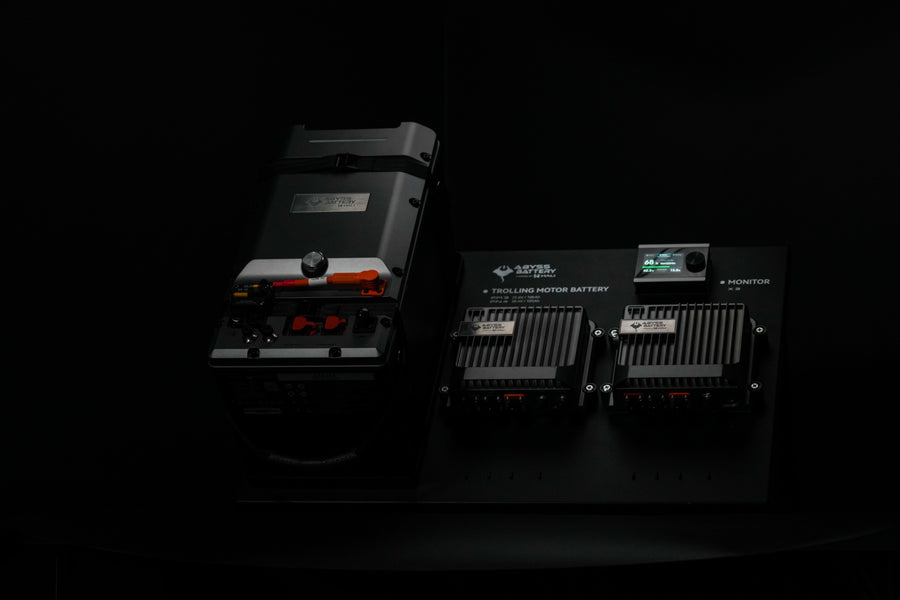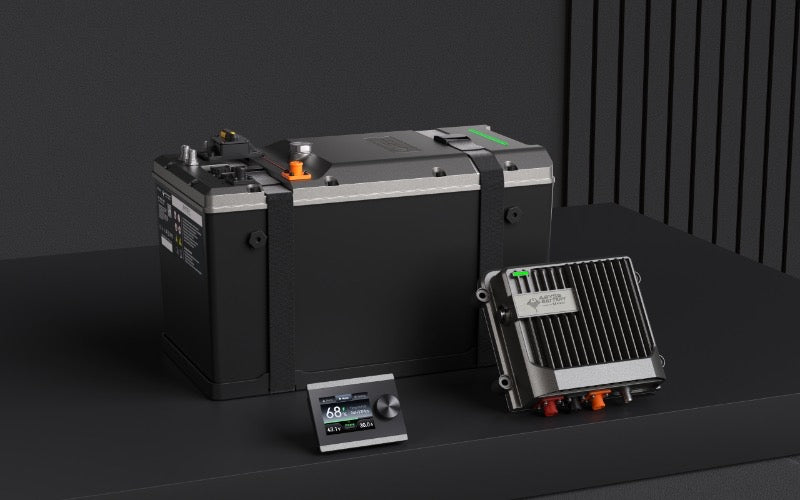Dual-Purpose vs. Deep-Cycle Marine Batteries

Whether you’re looking to take your bay boat out for a quick fishing trip in the intracoastal waters, or you have a large center console boat that you’re planning to take off shore for an overnight trip, that boat lives and dies at the whims of its batteries. The batteries on your boat may be similar to batteries that you’re used to already, such as ones that you find in a car, but they also have specific challenges that you need to consider when using them for marine purposes.
Another thing to consider when thinking about batteries for your boat is that there are multiple types of batteries, and they are not necessarily interchangeable. What you plan on doing in your boat might completely change the kind of battery you need, and you’ll likely need more than one kind unless you plan accordingly.
Batteries for starting your boat are very different than deep-cycle batteries, which themselves provide a different service than a dual-purpose battery will. For this article, we’ll focus on dual-purpose versus deep-cycle marine batteries. While there is a decent amount of overlap between the two, each has unique strengths as well as things to keep in mind as you use them. By the end, you’ll be able to tell which kind of battery is right for you.
What Is a Deep-Cycle Marine Battery?
The name of deep-cycle batteries gives a small hint as to how they’re supposed to work. They’re specifically designed for light usage over long periods of time. The deep-cycle terminology also refers to how often they can be discharged and recharged.
If you run an electric trolling motor or have a lot of electronic systems onboard your boat, deep-cycle batteries are an essential part of your boating equipment. Having a deep-cycle marine battery that you rely on means you’ll also need a separate starting battery to kickstart the engine when you first turn your boat on.
What Is a Dual-Purpose Marine Battery?
As the name suggests, dual-purpose marine batteries offer the abilities of both major kinds of batteries all in one unit. Rather than having a starting battery and a deep-cycle battery, dual-purpose batteries can handle both jobs at the same time. Boats with less room for larger or more numerous batteries can benefit from having a dual-purpose marine battery instead.
Depending on the battery’s construction and materials, you might find that they don’t perform as well as batteries with a more specific purpose in mind.
Note: Marine Starting Batteries
While not our main focus, it’s worth the time to mention the purpose of marine starting batteries. While they have a few other names, the major purpose for all of them is to start off your boat’s engine when you first turn it on. They don’t offer much in terms of long-term power, but they do provide a burst of energy that you’ll need to jumpstart your boat back awake after it’s been off for some time.
Benefits of Deep-Cycle Batteries
If we’re considering dual-purpose versus deep-cycle marine batteries, you might wonder what the major benefits are to choosing a deep-cycle battery if it only has one purpose. Compared to a dual-purpose battery, a comparable deep-cycle battery can get discharged and recharged many more times without any significant wear and tear. The thicker plates inside of a deep-cycle battery are tougher and can withstand more cycles than your typical battery.
Deep-cycle batteries are the kinds of batteries that you don’t need to worry about always plugging in over and over again. If you plan on keeping your boat out on the water for long periods of time while simultaneously having many other electronics also in operation, then a deep-cycle battery might be the best choice for you. They can help you run electronics such as fish locaters, audio systems for music, and other appliances you might need reliably for a longer period of time.
Benefits of Dual-Purpose Batteries
On the other hand, dual-purpose batteries give you the freedom to only need one kind of battery hooked up at a time, as opposed to deep-cycle batteries that also require a starting battery onboard. If you have a smaller boat that doesn’t take up a ton of space, dual-purpose batteries are even better because they help you save valuable space onboard, as well as cut down on overall weight.
If you don’t want to have to worry about setting up two different kinds of batteries just to get out on the water, dual-purpose batteries make it easy on you. While dual-purpose marine batteries can’t handle quite as many discharge and recharge cycles as a comparable deep-cycle battery, they also provide the functions of a starting battery which makes up for the slightly fewer cycles you can get from them.
Which Battery Is Right for You?
Choosing a battery doesn’t have to be a majorly difficult decision, but there are a few things to keep in mind. Chief among these is which of these batteries is more practical for your boat in terms of space and overall usage. A tiny fishing boat that doesn’t need to run constantly doesn’t need both a starting battery and a deep-cycle battery onboard to slow it down. In contrast, running a trolling motor or a bunch of electronics on your boat using only a dual-purpose battery might drain you faster than you’re comfortable with.
You may also want to consider how often you plan on recharging your battery. A deep-cycle battery can handle more frequent charges but might be overkill if you only use your boat infrequently and don’t need it to constantly be ready to go.
Tips for Protecting Your Batteries
No matter what kind of battery you go for, there are a few things you want to be aware of that will help you get the most out of them. For both deep-cycle and dual-purpose batteries, keep an eye out for these potential issues:
- Use a maintenance-type battery charger if you use your boat infrequently. This will prevent it from wearing down faster over time.
- Your battery tray should be tightly secured to your boat to prevent the batteries from rattling around
- Always check for signs of corrosion around your batteries. The connection points are where this kind of corrosion will show up the soonest.
- Cover the positive battery terminal to prevent possible sparks or further damage from outside sources.
Abyss Battery can help you find the perfect battery for any kind of boat you might have. Check out our 12-volt lithium marine battery, or any of our other models, to discover how Abyss makes batteries that last a long time and are the most reliable batteries you’ll ever use.





It’s interesting to know that deep-cycle batteries are designed to be used lightly over a lengthy period of time since they can be discharged and recharged. Actually, this made me think about people who work in the industrial field and how an AGM deep cycle battery can help with their operation. I just liked that these kinds of batteries are multi-purpose and can be utilized by a lot of operations in that field. Thanks for sharing this.
https://concordebattery.com/about/lightweight-agm-battery-from-concorde-battery-corporation.html
Can a deep cycle battery be used to start the big motor in case of emergency? Sometimes my regular starting battery gets low when I’m fishing for a long time, and I don’t start the big motor to keep it charged back up. I’m always afraid that I might not be able to start the motor in that case. I would prefer to have deep cycle batteries (connected in series since I have a 24-volt trolling motor), rather than dual purpose since I troll a lot, but I want to be able to jump to the starting battery if I need to.
Leave a comment